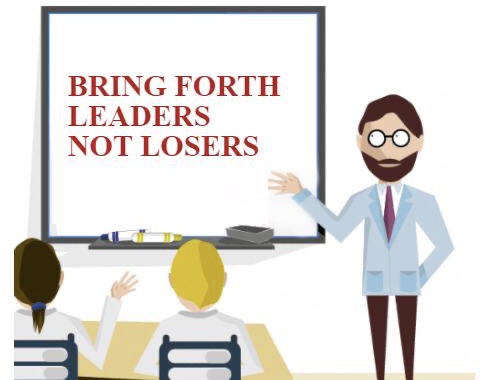Written by: M Sundaan Nasar Khan
Students are the building blocks of an entire nation. This future can be strong only when they are treated and instilled well. On the contrary, the frustrated and non-professional teachers play a crucial role in damaging this precious asset.
It is so unfortunate that, unlike other countries, the system of education in Pakistan is in the hands of those people, who unwillingly select this profession. It is a bitter truth that in Pakistan, when one fails to get one’sdream job, one opts to become a teacher to ruin precious minds, who could become successful individuals if they were not prone to face their teacher’s frustration. These tensed teachers are not capable of understanding the growing up children’spsychology. Their wrong behaviour damages the young ones’ capabilities. They are rather busy filling negativity into the pure souls by freeing their own selves from their personal worries and anxieties.
If these teachers learn to leave their tensions at their respective homes, they would treat whole class well. They should realise that their unfair attitude can lead to spoil young children. If these teachers start taking interest in their unwillingly chosen profession, they can give leaders to their nation otherwise instead of striving to become winners, these valuable individuals would not mind becoming losers.
On the other hand, unlike frustrated teachers, there are ones, who love to teach but unfortunately they are not professional. Their non-professional attitude similarly plays a vital role in collapsing a nation’s future.
Although such instructors are cheerful, pleasant and they enjoy educating children, unfortunately they lack talent. In other words, they do not hold a professional degree so they fail to understand every individual’s psychology. Their entire focus is on merely few students. Thus hardworking and active students win their complete attention, while rest of the class struggle to get a place in the good books of such teachers.
These frustrated and non-professional teachers behaviour reflects their anxiety in their actions which students have to bear. These teachers use corporal punishments to reduce their inner frustration. Just because teacher is himself fighting a battle with his inner self, students have to bear bigger punishments for their minor mistakes. There are some other teachers too, who believe that corporal punishments are important part of shaping the students’ character. They think without corporal punishment a student cannot be taught discipline. Teachers believe that it will be difficult for the school to achieve overall good grades if teachers do not practise corporal punishments.
This forceful way of teaching never allows students to learn so they are all busy finding other ways of clearing their assignments and exams. A certain phase comes when these students stop putting efforts to please their teachers, who are busy showing their favouritism merely towards few students, who are always a step ahead to finish their work on time. Such students no doubt worthy earning their instructors appreciation, but it does not mean that rest of the class should be left unguided. At this point, these non-professional teachers humiliate such less active students by comparing them with the cream of the class. Such teachers, with their favouritism towards few students do more harm to the students because it instills negativity and sense of jealousy in a pure soul.
It is important for the teachers to understand that fear of corporal punishment not only acts as a hindrance towards learning but also it affects the overall mental and physical health of the students. Due to the fear of being beaten-up, students are unable to learn well rather they are more willing to skip the learning process. This is the reason why school leaver numbers in Pakistan are high. Students do not enjoy classes as the system promotes forceful learning. Whereas students should themselves realise that they are in the school to learn something instead of being afraid of their teachers but these students are too young to complain such destructive attitude of their teachers ultimately they are not ready to respect their guides, when they themselves are not respected by their teachers.
Government realised the sensitive outcomes of the corporal punishments. Authorities pondered if such punishments existed, it could spoil an individual’s entire personality by affecting his/her physical and mental health. The government of Sindh is the first of all four provinces to take the initiative of banning the corporal punishment in Pakistan. Earlier than this, there existed a law- section 89 from Pakistan panel code- that allowed the teachers to use corporal punishments.
The Federal Directorate of Education (FDE) has issued a notification which states that teachers, who are found to be guilty of physically abusing children in schools, will be facing an inquiry and suffer consequences as per the Government Servants (Conduct) Rules 1964, and The Government Servants (E and D) Rules 1973.
The notification further went on to describe the kind of physical force which was barred including hitting, smacking, slapping, spanking a child with hands or with an implement such as a whip, stick, belt, shoe, wooden spoon and so on. Moreover, teachers were also barred from kicking, shaking or throwing a child, scratching, pinching, biting, pulling hair or boxing or twisting their ears, or forcing a child to stay in uncomfortable position, burning and scolding.
Teaching is a pretty profession. This leading role should be given in the hands of real professionals and mentally stable people so that they can help building a concrete future of a nation rather than raising pessimists and weak personalities to weaken a society.

